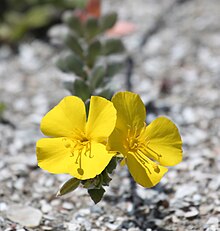| Camissoniopsis cheiranthifolia | |
|---|---|

| |
| Scientific classification | |
| Kingdom: | Plantae |
| Clade: | Tracheophytes |
| Clade: | Angiosperms |
| Clade: | Eudicots |
| Clade: | Rosids |
| Order: | Myrtales |
| Family: | Onagraceae |
| Genus: | Camissoniopsis |
| Species: | C. cheiranthifolia |
| Binomial name | |
| Camissoniopsis cheiranthifolia (Hornem. ex Spreng.) W.L.Wagner & Hoch | |
| Synonyms | |
Camissoniopsis cheiranthifolia, the beach suncup or beach evening primrose, is a species of the evening primrose family and is native to open dunes and sandy soils of coastal California, Baja California and Oregon.
Description
The beach suncup grows prostrate along the beach surface, forming mats more than 1 m across. It forms long stems growing from a central crown, lined with silvery grey-green leaves. The prostrate form and swinging stems allow the plant to survive well on the windy, shifting sands of the coast. The four-petalled flowers open in the morning (typical among suncups) and are bright yellow, fading to reddish.
Taxonomy
This plant is a well-defined diploid (2n = 14) species that has varying floral traits over its geographic distribution.
The specific epithet cheiranthifolia refers to the leaves having the appearance of Cheiranthus, an old name for a wallflower genus.

The two subspecies are:
- Camissoniopsis cheiranthifolia subsp. cheiranthifolia – A perennial herb that rarely has dense and silvery hairs, distributed from the Channel Islands to Oregon. This subspecies is generally self-pollinated.
- Camissoniopsis cheiranthifolia subsp. suffruticosa (S.Watson) W.L.Wagner & Hoch – A subshrub that generally has dense and silvery hairs, distributed from Baja California to Point Conception. This species is usually cross-pollinated and self-incompatible, and it hybridizes widely with Camissoniopsis bistorta.
Distribution and habitat
This species grows on the coastal dunes and sandy soils from southern Oregon through California and southwards towards El Rosario in Baja California.
References
- Dart, Sara R.; Samis, Karen E.; Austen, Emily; Eckert, Christopher G. (2012-02-01). "Broad geographic covariation between floral traits and the mating system in Camissoniopsis cheiranthifolia (Onagraceae): multiple stable mixed mating systems across the species' range?". Annals of Botany. 109 (3): 599–611. doi:10.1093/aob/mcr266. ISSN 0305-7364. PMC 3278294. PMID 22028462.
- "Plant of the Month - Beach Evening Primrose". Santa Monica Mountains Trails Council. Archived from the original on 2020-08-05. Retrieved 2022-01-17.
- Wagner, Warren L. (2012). "Camissoniopsis cheiranthifolia subsp. cheiranthifolia". Jepson eFlora. Jepson Flora Project. Archived from the original on 2021-05-18. Retrieved 17 January 2022.
- Wagner, Warren L. (2012). "Camissoniopsis cheiranthifolia subsp. suffruticosa". Jepson eFlora. Jepson Flora Project. Archived from the original on 2017-08-29. Retrieved 17 January 2022.
- Rebman, J. P.; Gibson, J.; Rich, K. (2016). "Annotated checklist of the vascular plants of Baja California, Mexico" (PDF). San Diego Society of Natural History. 45: 205.
External links
| Taxon identifiers | |
|---|---|
| Camissoniopsis cheiranthifolia |
|
| Oenothera cheiranthifolia | |
This Myrtales article is a stub. You can help Misplaced Pages by expanding it. |